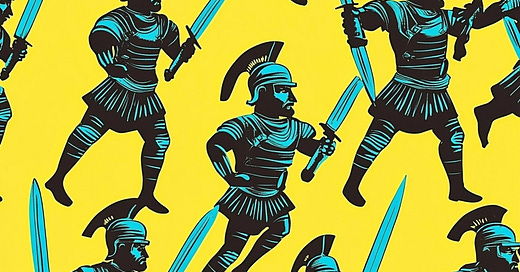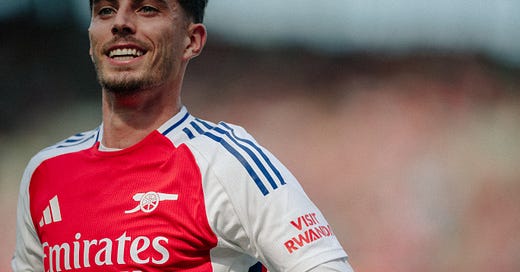
UPTICK IN HAMSTRING SURGERY AND WHY IT IS HAPPENING
EXPLAINING THIS HORRIBLE NEW TREND - AND WHY IT'S ACTUALLY A POSITIVE
***Just a little disclaimer because some people need it… I’m not a doctor. I don’t have a PHD. This document is sourced. My language might not cut it for a medical journal, but just follow along for the gist.***
Oh, now everyone wants to come to the party and start exploring the training methods of Mikel Arteta? Now it’s trendy? If you’ve been subbed up here, you’ll know that I am the only person on the planet who is allowed to talk about this.
So, because you’re loyal to Le Grove, I’ve been doing some digging on the “oh my gosh, another hamstring surgery” concern. My worry was centered on the severity of what surgery traditionally means to the proles like me and you. Hamstring injuries are on an upward trajectory, but have they taken a more severe turn as a consequence? Surgery, traditionally, is the last resort. You don’t want to be opening people up unless you absolutely have to.
Well, I can allay fears that our players are being butchered for no reason. Surgery is part of the innovation cycle in sports medicine. A lot of this has been driven by the massive advancements in scanning technology. The tools clubs and their doctors have at their disposal are five times what they used to be. So when exploring hamstring injuries, the readings have far more clarity, which gives doctors more accuracy when making repairs.
If you can see where the injury is, be more precise with how you cut, stitch, and repair, you greatly reduce the scar tissue once the injury has healed. Scar tissue, in an area like that, is a permanent weakness—one that leads to more injuries. Someone like Reece James, who has struggled with hamstring issues, is probably an example of a player carrying scar tissue. He had surgery, then broke down again, which is how long-term problems can develop.
So, in short: don’t look at surgery as a sign of something horrendous. It’s an innovation that allows players to have cleaner procedures, which—in theory—results in a stronger return.
As for the Gabriel injury being pinned on Arteta, I’m not so sure. If you watch the video, it’s probably more to do with the fact that Gabriel doesn’t often get into explosive sprint races from that deep, especially against players that fast. The big-boy defenders are usually better positioned to avoid foot races. So part of that injury might just be that he doesn’t often explode in that way—especially not after a 20-hour flight from Brazil.
That said, it’s also worth noting he’s had hamstring niggles throughout the year, a bit like Bukayo Saka. Fatigue doesn’t just happen in athletes. It’s cumulative. That’s why putting a player on the bench for one game doesn’t solve all their problems. Fatigue is a buildup of away days, sleepless nights, double sessions in the summer, and getting beaten up in games. If you’ve had your first child, you tend to say crazy shit early on like, ‘the sleepless nights aren’t that bad’, three weeks later, you are crying under the stairs because the cumulative effect has aged and greyed you.
Could Arteta have done more with Gabriel? Maybe. How many times have you seen Calafiori playing centre-back this season? Not many. Arteta likes Saliba and Big Gabi at the back, and that’s how he rolls. If Berta can achieve anything non-signing related next year, maybe it’ll be rotating Ben White and the Italian in with his favoured players a little more often.
It’s also worth addressing some of the misinformed views on how we manage players. People are pointing out that the data tells them Arteta has no impact on the injuries we’ve had. Firstly, the idea that Arteta—who runs Arsenal’s sporting department—isn’t impacting fitness is absurd. He picks the teams. He decides how to train, when to train, how hard to go. If you have an injury crisis, unless it’s ten broken legs, it’s highly unlikely the setup avoids scrutiny.
There are some basics in football you can’t avoid. Big teams play three games a week from September—that’s the most important one. Big teams have lots of internationals who not only have to play, they want to play. You can’t avoid these realities or control them.
What you can control is who you play and how you train them.
If you have a winter break and your decision is to take your players to Dubai and coach them nearly every day… it is your fault if one of them breaks. And it is your fault if the return game against West Ham is flat and dead. If you best player is on the bench at League Cup game and he comes on, it’s your problem that he’s tired. If you insist on taking the whole squad on dead away games in Champions League, it’s your fault they lack freshness.
It’s totally fair to contrast Arsenal against Liverpool this season.
Liverpool, last season, had a manager who played high-intensity rock-and-roll football—and his team died in February. Michael Edwards sought out a coach who could do a lot with a little, had great social EQ, and a track record of keeping players fit.
The outcome? Liverpool has two old legends, both over thirty, in the top five for minutes played this season. It’s not a miracle if it was part of the strategy.
Slot hasn’t rested his best players, so where’s the secret sauce? Probably in how he treats his players behind the scenes. How intense his training is. How much time off they get. How he manages player loads on an individual level.
Arteta has a younger squad, chock-full of gladiator players with great health histories—and our season has been undermined by a lack of player availability.
No club on the planet would look at the outcome of this season and not investigate how we ended up in this position.
Some of it is club-related: We knowingly went into the season with a small squad.
Some of it is rotation: Arteta played Kai and Saka when we could all see they were creaking—like Timber is right now.
Some of it will be training: You might have scoffed at this finger-pointing earlier in the season, but you couldn’t when John Cross leaked the training schedule for the R&R session in Dubai.
All of these things need an honest appraisal this summer. If Andrea Berta can’t persuade Arteta to change things, then his hiring was kind of pointless. Pep Guardiola has been so successful because he’s so good at keeping his players at peak fitness when it matters. This, for me, is the final ceiling Arteta needs to burst through if he’s to realise his full potential.
Can he do it? Who knows. He has a belief system that reads a little Dark Ages when it comes to the machismo of playing all the games. Accepting defeat on a belief is an ego dent. So we’ll see.
But there you have it. If you like this sort of writing, then sign up to a delicious subscription right this instant.

















Arsenal's season has been impacted by a combination of factors
1. Our preferred starting eleven when fit are playing too many minutes. As an example Declan Rice has played well over 3,000 minutes so far this season.
2. The fringe players in the squad are frankly grossly under used. According to Transfermarket:
Tomiyasu 6 Minutes
Tierney 261 Minutes
Neto 360 Minutes
Zinchenko 560 Minutes
Sterling 954 Minutes
White 1,020 Minutes
Kiwior 1,075 Minutes
3. Our results have been impacted this season by a combination of factors
a] Red Cards. We have dropped 7 points from winning positions.
b] Too many injuries particularly to key players both in attack and now defence.
c] Dull and Slow Build up football.
d] The absence of a top class strikers.
For these reasons some might argue a miracle that we are still in second place in the
league.
My view is that the management need to upgrade the bench and Arteta needs next season
to rotate better his squad. Apart from the second string goalkeeper and those out injured
there should be no player on the books who is playing fewer than 1,500 minutes during the
course of the season.
Not sure I agree with this, I'm also a sports med doc and I dont understand how hamstring ruptures are a good thing. There hasnt been any new techniques or innovations in "hamstring repair" its pretty much been the same for the last 20-30 years